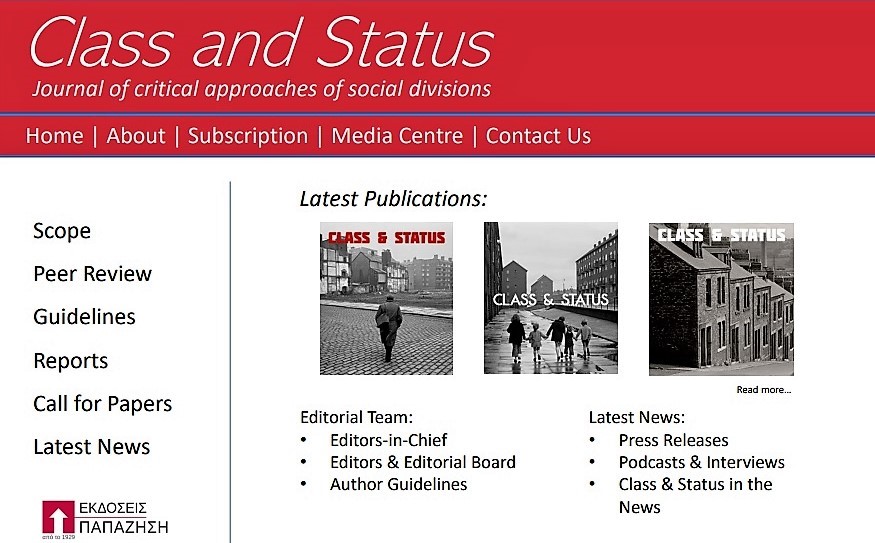Class and Status is a biannual, peer-reviewed journal that promotes critical thinking in the social sciences and humanities. The journal focuses on the study of social divisions and their making, maintenance, and reproduction. These principal issues have been significantly overlooked; and in the process of a series of abstractions, functional or consensual accounts and mainstream public policies, the framework and the meanings attached to social divisions have been squeezed out. The main scope of the journal is to revitalize scientific discourse along these lines. Class and Status aims to advance theoretical and empirical knowledge, to open new dialogues, and to broaden the horizons of social research on the issues above. Class and Status is an interdisciplinary journal that encourages contributions from all disciplines comprising a broad range of fields within the social sciences and humanities. The journal seeks to attract papers that promote the neglected theoretical approaches of Marxist and Weberian thought, the Frankfurt and Chicago Schools of sociology, and the post-Keynesian and Institutional schools of political economy. Submitted papers should maintain a historical approach, or should at least give special emphasis to the historical origins of the major theories and terms they adopt. Class and Status welcomes papers focusing on a wide range of different topics. Though not exhaustive, the list below shows some key topics of interest:
- Historical origins of class and status theories
- Social classes from a theoretical or empirical perspective
- Social Structure of Accumulation Theory
- Critique of dominant economic thought through post-Keynesian and Kaleckian perspectives
- Class and status, ideological and methodological approaches
- Economic inequality and issues concerning the distribution of income and employment
- Social stratification and mobility
- Labour processes in different socio-historical contexts
- Occupations and work ethics
- Historical and comparative studies on work and occupations
- New classifications in work, occupations, and workplaces
- Gender, race/ethnicity, migration, and class
- Working class communities
- Alienation
- Criminalisation, Crime and Social Status
- Social Control Processes
- Culture and Class Consciousness
Submissions including applied analyses focusing on specific social contexts are also welcome. The journal also aims to motivate studies that concentrate on topics falling outside the focus of mainstream literature, like that of labour reproductive mechanisms linking together divert groups and societies. Particular interest will be shown in submissions concerning the Eastern Mediterranean, cross-labour divisions and represetation of class.


